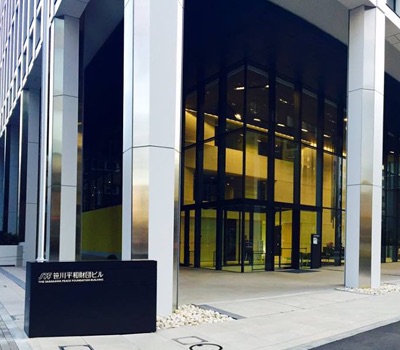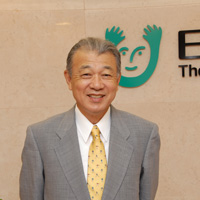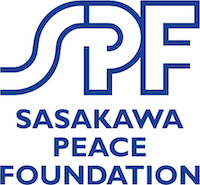About Us
Message from Chairman Yohei Sasakawa
First of all, I would like to express my apology because I was late to attend the very important meeting for Olympic Games and Paralympic Games on 2020, and The Nippon Foundation is very much involved in support for Paralympics, particularly people who have disability. In this building, we have a floor dedicated to support Paralympics athletes.I am quite sure that there are many people who are delighted about Sasakawa Fellowship Program. I am also so proud that we started this wonderful program many years ago and that we produced many excellent Sasakawa Fellows over many years. At the same time, I would like to express my appreciation to students who had decided to join this program.
When I visit at different countries, I make it a rule to meet Sasakawa Fellows who graduated from WMU. And I know that some of early students are retired from their posts. I think this is good proof for this long standing program. Some of old Sasakawa Fellows tell me that it is becoming difficult to be accepted or admitted to WMU Sasakawa Fellowship Program, so they feel that it becomes strong pride or prestige to graduate from WMU. On the other hand, they also feel that it is impossible for them to be accepted if they try it nowadays. It means that the reputation of this program gets higher as well as the quality of fellows becomes better.
I am glad to know that you are studying at new campus of WMU and I would like to express my gratitude to Swedish government who supported to build. I believe that it is so important for not only organizations but also individuals to keep changing in order to pursue higher quality.
There is something I think I would like WMU to do, and we have some issues we have to globally resolve. The one of issues is to eliminate LEPROSY I have dedicated myself for half my life. In the beginning, they said it was impossible to eliminate the disease, but now the disease is almost eliminated due to our effort. Considering from this point of view, we are facing the issue of ocean we have to share with all over the world. I am deeply worried how our precious ocean can get over the issue with excessive fishing, marine pollution, climatic warming as increasing the global population beyond seven billions.
I believe that WMU is the world’s best university in maritime society. At the same time, I dream of that WMU will be the world’s leading university in ocean relating with our lives.
If you ask me to talk about this topics, you may stay overnight at here listening to me, I stop here.
I would like three Japanese Sasakawa Fellowship students to take your colleague to different places in Japan that you will be able to know more about Japan during this week. I hope you will see how we live and how we operate this country.
Thank you.
When I visit at different countries, I make it a rule to meet Sasakawa Fellows who graduated from WMU. And I know that some of early students are retired from their posts. I think this is good proof for this long standing program. Some of old Sasakawa Fellows tell me that it is becoming difficult to be accepted or admitted to WMU Sasakawa Fellowship Program, so they feel that it becomes strong pride or prestige to graduate from WMU. On the other hand, they also feel that it is impossible for them to be accepted if they try it nowadays. It means that the reputation of this program gets higher as well as the quality of fellows becomes better.
I am glad to know that you are studying at new campus of WMU and I would like to express my gratitude to Swedish government who supported to build. I believe that it is so important for not only organizations but also individuals to keep changing in order to pursue higher quality.
There is something I think I would like WMU to do, and we have some issues we have to globally resolve. The one of issues is to eliminate LEPROSY I have dedicated myself for half my life. In the beginning, they said it was impossible to eliminate the disease, but now the disease is almost eliminated due to our effort. Considering from this point of view, we are facing the issue of ocean we have to share with all over the world. I am deeply worried how our precious ocean can get over the issue with excessive fishing, marine pollution, climatic warming as increasing the global population beyond seven billions.
I believe that WMU is the world’s best university in maritime society. At the same time, I dream of that WMU will be the world’s leading university in ocean relating with our lives.
If you ask me to talk about this topics, you may stay overnight at here listening to me, I stop here.
I would like three Japanese Sasakawa Fellowship students to take your colleague to different places in Japan that you will be able to know more about Japan during this week. I hope you will see how we live and how we operate this country.
Thank you.
Sasakawa Peace Foundation
The Sasakawa Peace Foundation (SPF) was established in September 1986, with endowments from The Nippon Foundation and the Japanese motorboat racing industry. The founding charter of SPF, which was developed amid increasing internationalization and a growing need for multilateral responses and solutions to a diverse array of problems in the 1980s, reflects an awareness of the need for Japan, as a strong economic power that has achieved remarkable growth, to play an active role in the international community. Based on this awareness, SPF has carefully considered Japan's role as a major nation in an increasingly interdependent international community, and, as a private nonprofit foundation, has worked to promote efforts to contribute to the international community.
How We See the World;
Now, more than 20 years since SPF was established, globalization has become a highly dynamic force in the world, as have movements opposed to globalization. The rise of China and India are emblematic of major changes taking place in the distribution of global wealth and power. As a result, issues in such areas as natural resources and the environment, population problems, and urbanization are reaching across national borders and becoming more acute. There is growing awareness of the negative aspects of globalization, which include new forms of inequality, the loss of traditional cultures, and frequent acts of terrorism.
Amid these global trends, Japan is experiencing a relative decline in its international standing in light of its failure to play a sufficiently leading role, the loss of its economic superiority, and other factors. Within Japan, people have voiced concern that if the country continues on its current path, it may be left behind by the tide of globalization.
At the same time, however, the increasingly borderless nature of the world, the rise of civil society, and growing international appreciation for the activities of NGOs, among other factors, have led to the emergence of a more diverse array of actors with the potential to play a role in resolving the problems facing the international community. This enhances the ability of SPF, which promotes international interaction and cooperation led by the private nonprofit sector, to advance creative solutions to international problems through cooperation with various organizations in Japan and around the world.
How We Work;
*If you have any questions, please feel free to contact us through below e-mail address.
wmujapan@spf.or.jp
Now, more than 20 years since SPF was established, globalization has become a highly dynamic force in the world, as have movements opposed to globalization. The rise of China and India are emblematic of major changes taking place in the distribution of global wealth and power. As a result, issues in such areas as natural resources and the environment, population problems, and urbanization are reaching across national borders and becoming more acute. There is growing awareness of the negative aspects of globalization, which include new forms of inequality, the loss of traditional cultures, and frequent acts of terrorism.
Amid these global trends, Japan is experiencing a relative decline in its international standing in light of its failure to play a sufficiently leading role, the loss of its economic superiority, and other factors. Within Japan, people have voiced concern that if the country continues on its current path, it may be left behind by the tide of globalization.
At the same time, however, the increasingly borderless nature of the world, the rise of civil society, and growing international appreciation for the activities of NGOs, among other factors, have led to the emergence of a more diverse array of actors with the potential to play a role in resolving the problems facing the international community. This enhances the ability of SPF, which promotes international interaction and cooperation led by the private nonprofit sector, to advance creative solutions to international problems through cooperation with various organizations in Japan and around the world.
How We Work;
-
- SPF promotes Japan's international contributions
- SPF was established to promote international interaction, understanding, and cooperation. Japan's international cooperation has increased greatly since SPF was established, and now, as a private nonprofit foundation, we must improve our capabilities to conduct policy research and make recommendations, strengthen our ability to disseminate information, and undertake more proactive forms of international cooperation.
In the past, SPF has carried out its overseas projects through direct interaction with partners in other countries. From now on it will also be essential to draw on Japan's latent capacity for international contributions, and to make effective use of Japan's broad range of expertise to help find solutions to increasingly complex international problems.
As well as undertaking international cooperation on its own, SPF will identify partners in Japan that possess relevant expertise, and will carry out or support projects in which these partners collaborate with counterparts overseas to solve problems. In this way SPF is working to expand and improve Japan's private nonprofit-sector-led international contributions.
-
- SPF seeks to resolve global issues
- SPF strives to identify and help resolve common challenges facing the international community in the context of issues that have arisen in Japan and other Asian countries.
There are many such challenges, but SPF focuses on problems that Japan has faced and addressed in advance of other nations, and issues considered critical to the Asian region. SPF formulates policy recommendations through practical investigation, research, and experimentation, and also provides support for these sorts of efforts undertaken by others, thereby helping to solve global problems.
-
- SPF endeavors to strengthen mutual understanding and cooperation with priority regions
- In order to contribute to the sound and stable development of the international community, SPF designates priority regions, as determined by societal conditions at the time, and promotes interaction and cooperative relations with the countries in those regions.
The priority regions selected are those with which the establishment of cooperative relations is considered helpful to the peace and stability of Japan and the world as a whole. A region may also be selected if greater understanding of the region or resolution of the region's problems is deemed vital to the interests of the international community.
*If you have any questions, please feel free to contact us through below e-mail address.
wmujapan@spf.or.jp
Contact
- Email:
- wmujapan@spf.or.jp
9am-5pm JST(UTC+9), Mon-Fri except public holidays in Japan.
Please note that we do NOT manage any direct application for the fellowship program.
- Phone:
- +81-(0)3-5157-5263
- Address:
- 1-15-16 Toranomon, Minato-ku, Tokyo 105-8524 JAPAN Google Maps

The front of Sasakawa Peace Foundation Building

